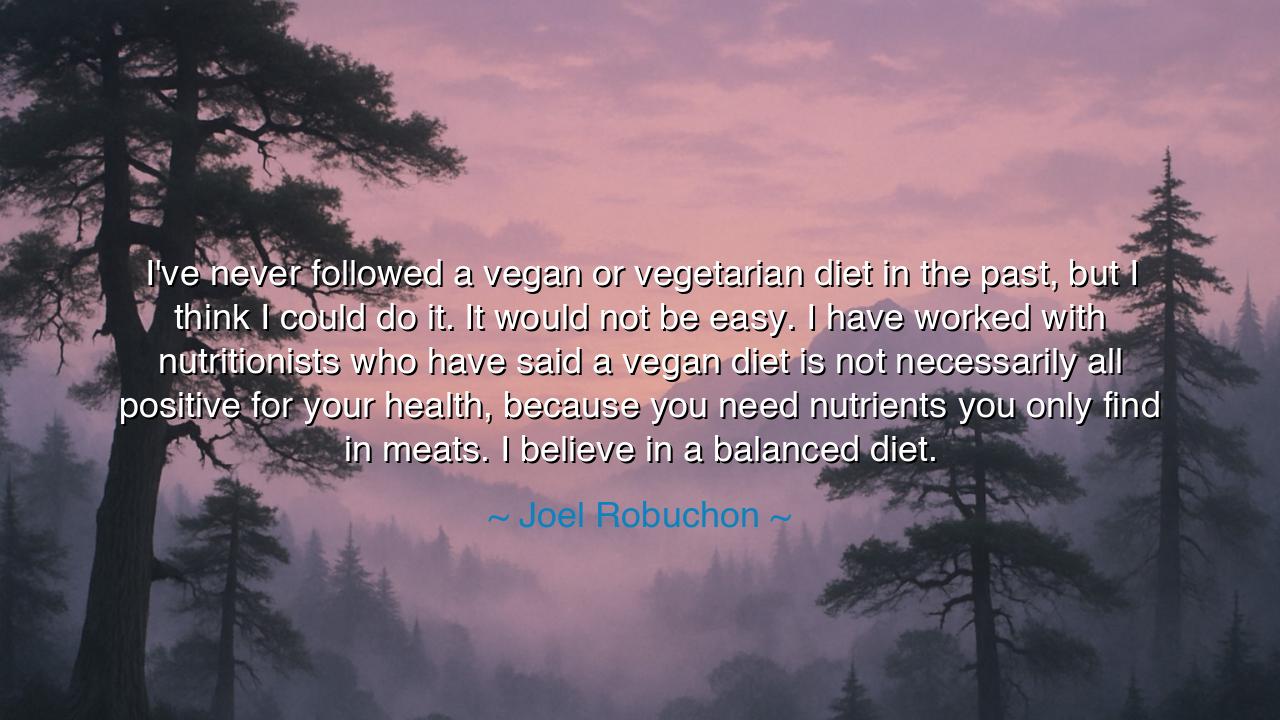
I've never followed a vegan or vegetarian diet in the past, but I
I've never followed a vegan or vegetarian diet in the past, but I think I could do it. It would not be easy. I have worked with nutritionists who have said a vegan diet is not necessarily all positive for your health, because you need nutrients you only find in meats. I believe in a balanced diet.






Hear, O children of wisdom, the words of Joel Robuchon, a man of great knowledge in the realm of food and nourishment, who speaks on the balance between diet, nutrition, and the true essence of what it means to care for the body: "I've never followed a vegan or vegetarian diet in the past, but I think I could do it. It would not be easy. I have worked with nutritionists who have said a vegan diet is not necessarily all positive for your health, because you need nutrients you only find in meats. I believe in a balanced diet." These words reflect the wisdom of a deep understanding—that the body is not a mere vessel to be filled, but a sacred entity that requires careful attention and respect, a balance between nourishment and the gifts of nature.
In the days of the ancients, the great philosophers and healers understood that health was not to be found in extremes, but in the balance of nature. Hippocrates, known as the father of medicine, taught that food was a form of medicine and that the body must be fed in a way that sustains its natural strength and vitality. He did not advocate for extreme diets, but for a balanced approach to nourishment, understanding that the needs of the body are as complex as the body itself. Joel Robuchon speaks to this timeless truth, acknowledging that the quest for health is not about rigid adherence to one specific diet, but about finding harmony in the foods that sustain us, whether from plants or animals.
Consider the ancient story of Alexander the Great, whose empire spanned the known world. He was a man of immense strength and intellect, yet he did not live on one diet alone. His army, traveling vast distances, relied on a variety of foods to maintain their energy and endurance. Alexander’s strategy was not just military but also nutritional—he understood that a balanced diet, one that included both plant and animal sources of nutrition, was essential to the strength and success of his soldiers. Like Robuchon, who speaks of the balance needed between plant and animal foods, Alexander knew that the body requires a variety of sources to reach its full potential. A diet of extremes, whether from meat or plants, could not fully sustain the human body’s complex needs.
In the Roman tradition, Cicero, the great orator and philosopher, often spoke of the importance of balance in life, whether in our thoughts, actions, or, indeed, in our diet. The Romans, while indulgent at times, understood that strength and vitality come from moderation, not excess. They did not subscribe to extremes in their food or lifestyle but sought a harmonious relationship with both. The Roman soldiers, for example, were nourished with a simple, balanced diet that included grains, fruits, vegetables, and meats—each playing its role in sustaining the body and mind. The teachings of Cicero reflect the wisdom that Joel Robuchon shares—that health lies not in the elimination of one food group, but in finding balance.
In our modern age, there is much debate about whether a vegan or vegetarian diet is truly the answer to the body’s needs. Some praise the plant-based diet for its benefits to the heart, the environment, and overall well-being, while others, like Robuchon, argue that such a diet may lack essential nutrients found in animal products. The ancients did not view food as a means of division but as a means of connection—to the earth, to the body, and to the spirit. They knew that health requires the right balance of nourishment, drawing from both the plant world and the animal world, and honoring the body’s complexity.
The lesson, O children, is this: health is a dance between nature and nourishment, one that cannot be achieved through extremes or rigid rules. Joel Robuchon teaches us that the key to true well-being lies in balance, a balance that allows us to enjoy the best that both the plant and animal kingdoms have to offer. A vegan diet may offer many benefits, but it cannot be the sole path to health for all people. Similarly, a diet rich in meat may sustain the body in some ways, but it must be balanced with other nutrients from plants. The body, like the mind, requires a variety to thrive—just as Socrates and Aristotle understood that life’s deepest truths were found in balance, so too is the body’s true vitality found in the careful nourishment of both plant and animal foods.
So, O children, let us approach our diet with the wisdom of the ancients, and with the understanding that balance is the cornerstone of health. Whether we choose to follow a plant-based diet, include meat, or seek a middle ground, let us always remember that the body requires a wide variety of nourishment—not just to survive, but to thrive. As Joel Robuchon wisely teaches, we must respect the needs of the body, understanding that true health comes not from extremes but from a careful, thoughtful balance of all that nature has to offer. Let us seek this balance in our lives, so that we may live fully, in harmony with the earth and with our own bodies.






AAdministratorAdministrator
Welcome, honored guests. Please leave a comment, we will respond soon